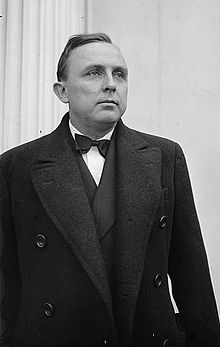Eurith D. Rivers
Eurith Dickenson Rivers (born December 5, 1895 in Center Point , Prairie County , Arkansas , † June 11, 1967 in Atlanta , Georgia ) was an American politician ( Democratic Party ) and governor of Georgia.
Early years and political advancement
Eurith Rivers studied law in Illinois and graduated in 1923. Then he settled in Cairo , Grady County, Georgia, and became a justice of the peace and district attorney. He then moved to Milltown (now Lakewood ) and published a local newspaper. Soon he also rose politically. In 1924 he was elected to the Georgia House of Representatives. In 1926 he made the leap to the state senate . Like many rural Georgia politicians at the time, Rivers was an active member of the Ku Klux Klan . Nevertheless, as a politician, he stood up for the concerns of the poor farmers and supported federal programs in this direction. He campaigned for President Roosevelt's New Deal , while incumbent Governor Eugene Talmadge rejected it. When in 1936 Talmadge could not run for governor for the third time in a row due to a constitutional clause, Rivers - at that time again in the House of Representatives of Georgia and there as speaker - seized the opportunity and ran for his part.
Georgia Governor
As governor, he created the political prerequisites for federal subsidies for the electrical development of rural areas and public housing. His predecessor had strictly refused. At the end of his second term in 1940, he had received $ 17 million from federal funds for electrification alone. Rivers also launched its own program to overcome depression . He reformed the health and prison system. He invested most in training. Expenditures for this purpose increased from $ 29 million under his predecessor to $ 49 million in his tenure. This included increased salaries for teachers as well as free learning resources. All of these reforms, however, did not eradicate the racism of the time (which Rivers hardly intended as a member of the Ku Klux Klan). However, some of the reforms, albeit weakened, also benefited the state's black residents.
In his second term, however, the negative aspects of his reforms became apparent. In autumn 1939 the teachers' salaries could no longer be paid. Parliament rejected tax increases and Rivers tried to raise the necessary funds through internal reallocations within the budget. In the process, he came into conflict with his transport minister, who rejected cuts in his portfolio. The case eventually went to court, which in the end approved the transfer. The meanwhile rather heated argument with the minister had seriously damaged the reputation of the governor and his policies. There were also allegations of corruption against four members of his government, two of whom were convicted. In 1942, after his term of office was over, Rivers was also charged with various corruption cases, but not convicted. Regardless of these problems, he could not be re-elected in 1940 anyway because of the constitutional requirements. His old opponent Eugene Talmadge was chosen instead.
Old age and death
In 1946 he made one last unsuccessful attempt to be re-elected governor. He devoted himself to his private interests and became a successful businessman who, at the time of his death in 1967, owned several radio stations.
Web links
- The New Georgia Encyclopedia (English)
- Eurith D. Rivers in the database of Find a Grave (English)
- Eurith D. Rivers in the National Governors Association (English)
| personal data | |
|---|---|
| SURNAME | Rivers, Eurith D. |
| ALTERNATIVE NAMES | Rivers, Eurith Dickenson (full name) |
| BRIEF DESCRIPTION | American politician |
| DATE OF BIRTH | December 5, 1895 |
| PLACE OF BIRTH | Center Point , Arkansas |
| DATE OF DEATH | June 11, 1967 |
| Place of death | Atlanta , Georgia |

